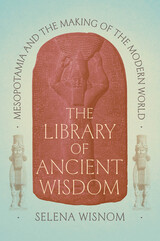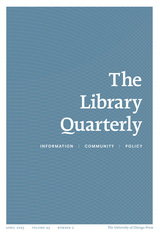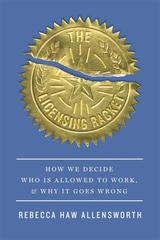3 books about Biomedical Technology
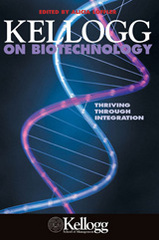
Kellogg on Biotechnology
Thriving through Integration
Alicia Loffler
Northwestern University Press, 2005
Biotechnology is the new capital. The stakeholders in this revolution are many: the scientists who generate the knowledge in fields where the pace is maddeningly fast; the technologists who make ideas a reality; the managers who struggle to deal with an industry where the old rules of thinking do not always apply; the venture capitalists who provide funds based on market moods rather than science; the health care, agricultural, chemical, and pharmaceutical industries whose once cozy enclaves have been revolutionized and are now barely recognizable; the law professionals and ethicists who have to grapple with issues unimaginable just a few years ago; the public policy makers who struggle with the complex issues and have to make decisions quickly, or risk being left behind; and, finally, the society and individuals who are in the midst of all that is taking place. This book addresses this diverse constituency and offers an integrated view of exciting new biotechnologies, both from a science and business perspective.
The book walks the reader through the "what"--what are some of the newest biotechnologies that will revolutionize the way we think about health?; the "how"--how to transform those technologies into profitable products and companies; and the "who"--who will benefit from these technologies?
Kellogg on Biotech is the outgrowth of a collaborative student-faculty effort called TechVentures at the Kellogg School of Management. Their research forms the raw material for Kellogg on Biotech.
The book walks the reader through the "what"--what are some of the newest biotechnologies that will revolutionize the way we think about health?; the "how"--how to transform those technologies into profitable products and companies; and the "who"--who will benefit from these technologies?
Kellogg on Biotech is the outgrowth of a collaborative student-faculty effort called TechVentures at the Kellogg School of Management. Their research forms the raw material for Kellogg on Biotech.
[more]
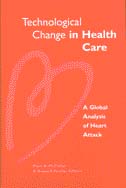
Technological Change in Health Care
A Global Analysis of Heart Attack
Mark B. McClellan and Daniel P. Kessler, Editors
University of Michigan Press, 2002
Evidence from the United States suggests that technological change is a key factor in understanding both medical expenditure growth and recent dramatic improvements in the health of people with serious illnesses. Yet little international research has examined how the causes and consequences of technological change in health care differ worldwide. Seeking to illuminate these issues, this volume documents how use of high-technology treatments for heart attack changed in fifteen developed countries over the 1980s and 1990s. Drawn from the collaborative effort of seventeen research teams in fifteen countries, it provides a cross-country analysis of microdata that illuminates the relationships between public policies toward health care, technology, costs, and health outcomes.
The comparisons presented here confirm that the use of medical technology in treatment for heart attack is strongly related to incentives, and that technological change is an important cause of medical expenditure growth in all developed countries. Each participating research team reviewed the economic and regulatory incentives provided by their country's health system, and major changes in those incentives over the 1980s and 1990s, according to a commonly used framework. Such incentives include: the magnitude of out-of-pocket costs to patients, the generosity of reimbursement to physicians and hospitals, regulation of the use of new technologies or the supply of physicians, regulation of competition, and the structure of hospital ownership. Each team also reviewed how care for heart attacks has changed in their country over the past decade.
The book will be of enormous importance to health economists, medical researchers and epidemiologists, and policymakers.
Mark McClellan is Associate Professor of Economics and of Medicine and, by courtesy, of Health Research and Policy, Stanford University. He is a National Fellow, the Hoover Institution. Daniel P. Kessler is Associate Professor of Economics, Law, and Policy in the Graduate School of Business, Stanford University, and a Research Fellow, the Hoover Institution.
The comparisons presented here confirm that the use of medical technology in treatment for heart attack is strongly related to incentives, and that technological change is an important cause of medical expenditure growth in all developed countries. Each participating research team reviewed the economic and regulatory incentives provided by their country's health system, and major changes in those incentives over the 1980s and 1990s, according to a commonly used framework. Such incentives include: the magnitude of out-of-pocket costs to patients, the generosity of reimbursement to physicians and hospitals, regulation of the use of new technologies or the supply of physicians, regulation of competition, and the structure of hospital ownership. Each team also reviewed how care for heart attacks has changed in their country over the past decade.
The book will be of enormous importance to health economists, medical researchers and epidemiologists, and policymakers.
Mark McClellan is Associate Professor of Economics and of Medicine and, by courtesy, of Health Research and Policy, Stanford University. He is a National Fellow, the Hoover Institution. Daniel P. Kessler is Associate Professor of Economics, Law, and Policy in the Graduate School of Business, Stanford University, and a Research Fellow, the Hoover Institution.
[more]
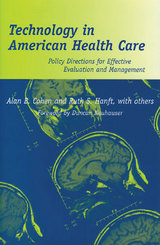
Technology in American Health Care
Policy Directions for Effective Evaluation and Management
Alan B. Cohen and Ruth S. Hanft, with William E. Encinosa, Stephanie M. Spernak, Shirley A. Stewart, and Catherine C. White
University of Michigan Press, 2004
"The definitive overview of health technology assessment in the U.S. and Europe, the biotech industry, adoption and use of medtech in health care."
---The World Future Society, Best Books and Reports
---The World Future Society, Best Books and Reports
"This excellent book provides a broad overview of the development, impact, and evaluation of health technology in the United States. . . .The authors take a well-organized and thorough approach to address these topics, combining reviews of each with case examples of particular technologies. . . .Given the broad scope of the book, it could serve as a text for students, an introduction to the field for healthcare professionals, or a tool for academics and policymakers wishing to fill knowledge gaps outside their disciplines. . . .The book makes a compelling case for the logic and potential benefits of medical technology evaluation as a tool for improving health care."
---Journal of the American Medical Association
"By being comprehensive in their review, the authors chart a clear path to understanding the future of health care technology in America. They clarify the technical methods for evaluation and provide insight into the sociopolitical aspects of development and diffusion. Case studies are informative. Excellent reading for students and health professionals either as a textbook or as an off-the-shelf guide to methods for deciding among alternative technologies."
---Norman W. Weissman, University of Alabama
"Technology today dominates every aspect of health care. This useful book offers a diverse range of perspectives for students, professors, and medical practitioners who wish to understand how to evaluate medical technology."
---Joel Howell, University of Michigan Medical School
Technology in American Health Care is a comprehensive, multidisciplinary guide to understanding how medical advances-new drugs, biological devices, and surgical procedures-are developed, brought to market, evaluated, and adopted into health care.
Cost-effective delivery of evidence-based health care is the sine qua non of American medicine in the twenty-first century. Health care decision makers, providers, payers, policymakers, and consumers all need vital information about the risks, benefits, and costs of new technologies in order to make informed decisions about which ones to adopt and how to use them. Alan B. Cohen and Ruth S. Hanft explore the evolving field of medical technology evaluation (MTE), as well as the current controversies surrounding the evaluation and diffusion of medical technologies, including the methods employed in their assessment and the policies that govern their adoption and use.
The book opens with an introduction that provides basic definitions and the history of technological change in American medicine, and a second chapter that explores critical questions regarding medical technology in health care. Part I discusses biomedical innovation, the development and diffusion of medical technology, and the adoption and use of technology by hospitals, physicians, and other health care organizations and professions under changing health care market conditions. Part II examines the methods of MTE-including randomized controlled trials, meta-analyses, economic evaluation methods (such as cost-benefit, cost-effectiveness, and cost-utility analyses), and clinical decision analysis. Part III focuses on key public policy issues and concerns that affect the organization, financing, and delivery of health care and that relate importantly to medical technology, including safety, efficacy, quality, cost, access, equity, social, ethical, legal, and evaluation concerns. All three parts of the book provide a historical perspective on the relevant issues, methods, and policy concerns and contain examples of technologies whose development, adoption, evaluation, and use have contributed to our understanding of the field.
This book will be invaluable in making MTE more accessible to individuals who are directly involved in the evaluation process and those who are touched by it in their professional lives-policymakers, clinicians, managers, and researchers.
[more]
READERS
Browse our collection.
PUBLISHERS
See BiblioVault's publisher services.
STUDENT SERVICES
Files for college accessibility offices.
UChicago Accessibility Resources
home | accessibility | search | about | contact us
BiblioVault ® 2001 - 2025
The University of Chicago Press



